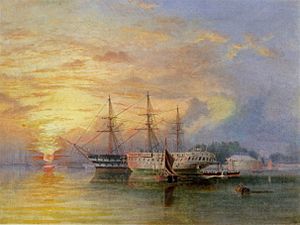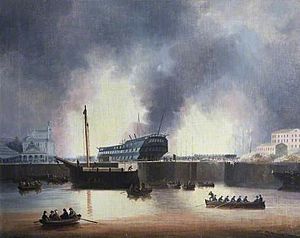HMS St George (1840) facts for kids

HMS St George and Arethusa on the Hamoaze near Bull Point, by Edward Snell (engineer)
|
|
Quick facts for kids History |
|
|---|---|
| Name | HMS St George |
| Ordered | 27 May 1819 |
| Builder | Plymouth Dockyard |
| Laid down | May 1827 |
| Launched | 27 August 1840 |
| Fate | Sold, 1883 |
| General characteristics | |
| Class and type | Broadened Caledonia-class ship of the line |
| Tons burthen | 2694 bm |
| Length | 205 ft 5.5 in (62.624 m) (gundeck) |
| Beam | 54 ft 6 in (16.61 m) |
| Depth of hold | 23 ft 2 in (7.06 m) |
| Propulsion | Sails |
| Sail plan | Full-rigged ship |
| Armament |
|
HMS St George was a very large and powerful warship of the Royal Navy. It was known as a 'first-rate ship of the line', which meant it was one of the biggest and strongest ships of its time. This impressive vessel was launched on August 27, 1840, at Plymouth, England.
Meet HMS St George
The HMS St George was a huge sailing warship. It was part of the Royal Navy, the United Kingdom's navy. The ship was built at the Plymouth Dockyard. Its construction started in May 1827. It took many years to build this massive ship.
Building a Giant Ship
When it was finished, HMS St George was 205 feet long. That's about the length of two tennis courts! It was also 54 feet wide. The ship had 120 guns, making it incredibly powerful. These guns included 32-pounder cannons and 68-pounder carronades. Carronades were shorter, powerful cannons used for close-range fighting.
A Close Call with Fire
Even before HMS St George sailed, it faced a big danger. On September 25, 1840, a huge fire broke out at the Plymouth Dockyard. The fire started on two other ships, HMS Talavera and Imogene. These ships were completely burned.
The fire spread quickly to nearby buildings and equipment. It caused a lot of damage. People worked hard to stop the fire. They even tore down some buildings to create gaps. This helped to contain the flames. Luckily, HMS St George was far enough away. It escaped the fire and was not destroyed. The damage from the fire was very expensive. It cost a huge amount of money for that time.
Life After Sails
In 1859, HMS St George was updated. It was fitted with a screw propeller. This meant it could now be powered by an engine, not just sails. This was a big change for warships. It made them faster and more reliable. The ship served the Royal Navy for many years. Finally, in 1883, HMS St George was sold.


